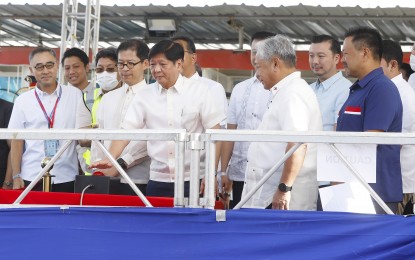
SUBWAY PROJECT LAUNCH. President Ferdinand R. Marcos Jr. pushes the button as he leads the launch of the Metro Manila Subway Project’s tunnel boring machine the project in Barangay Ugong, Valenzuela City on Jan. 9, 2023. With a total length of 33 kilometers from Valenzuela City to Pasay City, the MMSP construction is also projected to generate 18,000 jobs and boost the economic activities of communities in Metro Manila. (PNA photo by Alfred Frias)
MANILA -- The Metro Manila Subway Project (MMSP) is expected to improve living standards, including the riding public, and propel the country’s economic rebound, Transportation Secretary Bautista said Monday.
At the groundbreaking ceremony for the MMSP’s Contract Package 103, Bautista said the big-ticket railway project has far-reaching benefits such as comfort and convenience for commuters, creation of employment opportunities and the Philippines’ economic development.
“Today is another critical step towards that aspiration towards the convenience and comfort of Filipino commuters towards a transport infrastructure that catalyzes economic rebound,” Bautista said.
“The socio-economic benefits of the MMSP even exceeds our expectations." The project is part of President Ferdinand R. Marcos Jr.’s Build, Better, More infrastructure development program.
Bautista vowed an elevated and global standard public transportation for Filipinos.
“We promised President Bongbong Marcos a global-standard transport system,” he said.
Bautista also expressed his gratitude to the Japanese government and the Department of National Defense for supporting the country’s first-ever underground railway.
“This groundbreaking inside a military camp depicts the overlapping multi-sectoral support for the MMSP. The Secretary of Defense is accompanied by the AFP Chief of Staff and the local chief executive of Quezon City to express their support,” he added.
The Contract Package 103 involves two underground stations and tunnels, including the Anonas and Camp Aguinaldo stations.
Support
Meanwhile, Armed Forces of the Philippines (AFP) chief of staff Gen. Andres Centino said the military strongly supports the project that would greatly boost government efforts to minimize traffic congestion and carbon emissions.
"It is without a doubt that our soldiers, together with the rest of our fellow Filipinos, look forward to the opportunities and the possibilities that come with the completion of this project," he said in a statement Monday.
Meanwhile, Department of National Defense (DND) officer in charge Undersecretary Carlito Galvez Jr. lauded the DOTr for the progress of the MMSP.
"It is a significant milestone for our country that brings the Filipino people closer towards realizing our longtime collective dream and aspiration of having an accessible, affordable, comfortable, and safe mass public transport system," he added.
Billed as the Philippines’ “crown jewel” of mass transit system, the Japan-funded Metro Manila Subway will cut across eight cities that will stretch from Valenzuela City in the northern part of Metro Manila to FTI-Bicutan in Parañaque City in the south with a spur line to NAIA Terminal 3 in Pasay City.
With a total of 33-kilometer route length and 17 stations, the country’s first underground railway system aims to cut travel time between Quezon City and Ninoy Aquino International Airport in Pasay City to just 45 minutes.
Once operational, the railway system can service up to 519,000 passengers daily. (with report from Priam Nepomuceno/PNA)
